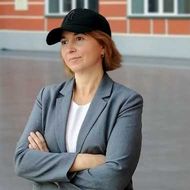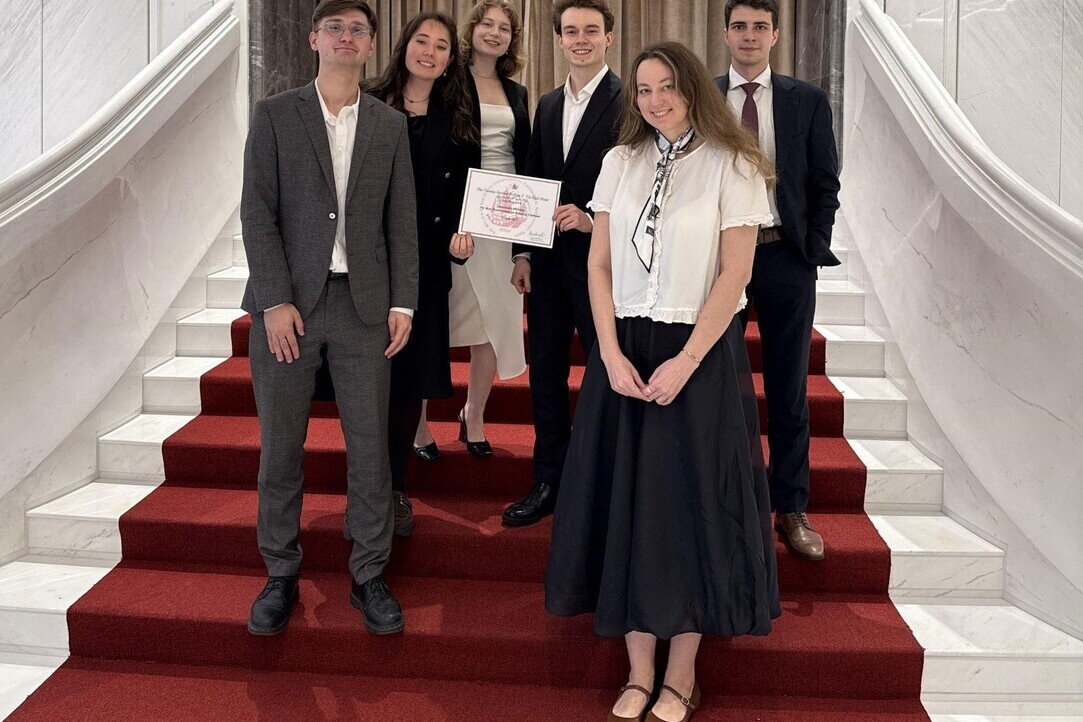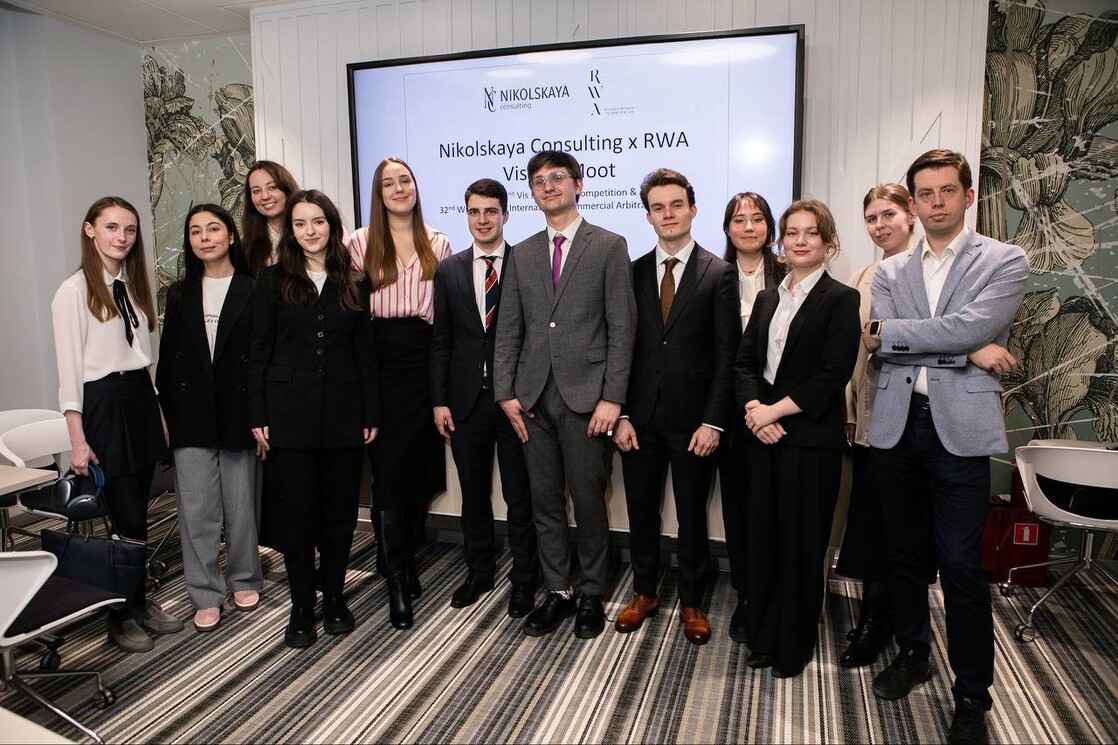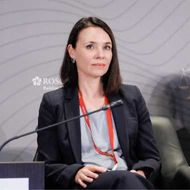- A
- A
- A
- ABC
- ABC
- ABC
- А
- А
- А
- А
- А
- HSE University
- Faculty of Law
- School of International Law
- News
- HSE University students successfully participated in the Willem C. Vis East International Commercial Arbitration Moot in Hong Kong
-
School
- About the School
- Research
- Academics
- "HSE University Journal of International Law"
-
Research and Study Laboratories and Groups
-
Research and Study Laboratories
-
Research and Study Groups
-
- Research and Methodology Units
- HSE Research Seminar on International Law
- Ph.D. Seminar
- Undergraduate track ‘International Law’
-
Projects
-
Status: active
- Applied project «Philip C. Jessup international law moot court competition training 2023-2024»
- Applied project 2024-2025 “Preparation for the Willem C. Vis Moot Competition, season 2024-2025”
- Fundamental Research Project "Legal Mechanisms for Overcoming Inequality"
- Participation of Young Lawyers as Clerks of the International Commercial Arbitration Court at the Chamber of Commerce and Industry of the Russian Federation
- Research project: International Competition ‘Dispute Resolution in the EAEU–2024’: Preparation and Participation of the Faculty of Law's Team
-
Status: completed
-
- Staff Members
-
Educational programs
- Bachelor's Programmes
- Master's Programmes
- Doctoral School of Law
Moscow, 3 Bolshoy Trekhsvyatitelsky Pereulok, rooms 227, 228b

E-mail: svetlana.smirnova@hse.ru
Located at a crossroads of global, regional, and national interests, contemporary international law affects almost all spheres of society. The School of International Law keeps pace with significant international events and legal adjudication in order to provide hands-on education that prepares future lawyers and legal scholars for the demands of the current legal landscape. The School is at once a ‘think tank’ that provides expert analysis and a producer of top legal experts and lawyers in international law.
Olga Starshinova, Elena Murashko.
Chinese Journal of International Law. 2025. Vol. 24. No. 3.
In bk.: Sanctions, Business and Human Rights. Clarity Press, 2025. P. 346-366.
 MANDATORY CORPORATE HUMAN RIGHTS DUE DILIGENCE MODELS: SHOOTING BLANKS?
MANDATORY CORPORATE HUMAN RIGHTS DUE DILIGENCE MODELS: SHOOTING BLANKS?
Rusinova V., Sergei K.
Law. LAW. Высшая школа экономики, 2021

HSE University students successfully participated in the Willem C. Vis East International Commercial Arbitration Moot in Hong Kong

This year, the HSE University was represented by five students of the Faculty of Law:
- Abdulkadir Gadzhiemenov – Master’s program “International Trade Law and Dispute Resolution”, 1st year;
- Artem Gritsuk – Bachelor’s program “Law”, 4th year;
- Veronika Gorenitsa – Master’s program “Lawyer in Business”, 1st year;
- Danila Eroshin – Bachelor’s program “Law”, 4th year;
- Mariia Semaeva – Bachelor’s program “Law”, 5th year.
The Willem C. Vis Moot is one of the largest and most prestigious competitions for law students globally. It consists of two stages: a written phase (from October to January) during which teams prepare memoranda on behalf of the claimant and respondent, and an oral phase (from February to April), which includes rounds in the format of arbitral hearings – first practice rounds (pre-moots) all over the world, followed by main rounds of the competition traditionally held in Hong Kong and Vienna.
Each year, the competition problem addresses the application of various provisions of the United Nations Convention on Contracts for the International Sale of Goods (CISG, 1980), along with procedural issues frequently encountered in real arbitration practice. This year’s case concerned a dispute arising from the contested termination of a turnkey green hydrogen plant project. Students had to discuss the legal consequences of non-compliance with the mediation stage of a multi-tier dispute resolution clause due to the – assumed – futility of the mediation, the exclusion of documents from the file that allegedly have been submitted in breach of legal privileges or confidentiality agreements, the applicability of the CISG to mixed contracts awarded in a public procurement process as well as its possible exclusion by the parties in their choice of laws clause.

In preparation for the oral rounds, the team held friendly practice rounds with universities from Brazil (Federal University of Rio Grande do Sul), Australia (La Trobe University), China (University of International Business and Economics, Beijing), Romania (George Emil Palade University), and Switzerland (University of Fribourg). In-depth legal research and weekly oral practice sessions contributed significantly to the team’s success in both the pre-moots and the main competition.

The team advanced to the Round of 16 at the Asia Pacific Vis Pre-Moot in Kota Kinabalu, Malaysia. Prior to the main rounds in Hong Kong, the team also gained valuable experience at several pre-moots, including the 13th Istanbul Pre-Moot, the Nikolskaya Consulting x Russian Women in Arbitration (RWA) Vis Pre-Moot and the 15th Moscow Pre-Moot in Moscow, and the Moot Shanghai 2025. At these events, the team met teams from Germany, India, Bulgaria, China (including Hong Kong SAR), Turkey, and Russia.
This year, the main round in Hong Kong saw a record-breaking number of participants – over 150 teams. HSE’s team competed against Symbiosis Law School (India), Tashkent State University of Law (Uzbekistan), Hokkaido University (Japan), and the University of International Business and Economics, Shanghai (China). Arbitrators for the oral rounds included legal practitioners and academics from Australia, Canada, China, Germany, India, Ireland, Kyrgyzstan, Spain, the United Kingdom, and the United States.

The team received an Honourable Mention for Best Memorandum on Behalf of Claimant, recognising the high level of legal analysis demonstrated in the written stage of the competition.
Team members shared their reflections on their participation in the Vis Moot.
Mariia Semaeva: "Everyone has their own reason for participating in Vis Moot. For me, it was a chance to take my public speaking skills to the next level and overcome personal fears. The competition taught me resilience and how to see mistakes as valuable lessons. Despite the time and effort required, I fulfilled my dream of presenting our team’s work to arbitrators from various jurisdictions. I can confidently say I spent my final undergraduate year meaningfully and will graduate from HSE University grateful for the experience, the memories, and the people I met along the way”.
Artem Gritsuk: "You have to be prepared – Vis Moot is time-consuming. But it’s also deeply motivating, pushes you to grow as a legal professional, and brings incredible experience and many positive emotions. It’s a great opportunity to connect with the global legal community”.
Danila Eroshin: "Vis Moot is an unforgettable experience that expanded my worldview, including my understanding of law. The competition and its pre-moots gave us the chance to meet people with different perspectives and legal backgrounds. Despite those differences, we were able to communicate and convey our ideas, which is truly inspiring”.
Veronika Gorenitsa:"Teamwork is essential for achieving shared goals. Thanks to our coaches, we became a real team. During the writing phase, we supported each other in researching sources and forming arguments. During the oral rounds, while some of us presented, others searched for additional arguments, carefully listened to feedback, and helped refine our positions. We also spent time together outside of training, talking and exploring. Though we seemed very different at first, we found much in common – and stayed close even after the competition ended”.
Abdulkadir Gadzhiemenov: "Vis Moot is a rite of passage into international arbitration. But it’s also a personal test: six months of discussing the CISG and arbitral awards over breakfast, lunch, and dinner shapes your thinking, sharpens your speaking, and reshapes the understanding of your own limits. That’s why Vis Moot is exactly as impactful as everyone says it is”.
The team’s preparation was traditionally supported by the School of International Law and the Chair of International Justice at the HSE Faculty of Law.
The team expresses sincere gratitude to their coaches, alumni of the HSE Faculty of Law:
- Anna Avdulova, associate at Ivanyan and Partners;
- Vladimir Kostsov, lecturer at the School of International Law and counsel at Stonebridge Legal;
- Margarita Drobyshevskaia, deputy counsel at the Singapore International Arbitration Centre (SIAC).
Their expertise, guidance, and mentorship were integral to the team’s success.
Special thanks also go to former HSE Vis Moot participants Anna Zaikina, Anna Trishkina, Kamilla Makhmudova, and Maria Eremenko for their support during training sessions.
The team is also deeply grateful for the financial support provided by law firms VERBA LEGAL, ALUMNI Partners, Ivanyan and Partners, international consulting firm Fidem Research Group, law firms LEVEL Legal Services, Saveliev, Batanov & Partners, and KIAP Law Firm. Generous financial assistance was also provided by Dmitry Kaysin, a partner at Asari Legal. The team extends special thanks to Ivanyan and Partners for providing facilities for training sessions and online rounds, as well as to Shanghai International Arbitration Center (SHIAC) for providing a venue for a practice round in Shanghai.
Congratulations to the team and coaches – and best of luck in next year’s competition!
Try-outs for the new team will take place in September 2025 – stay tuned for announcements on the Faculty of Law website.
- About
- About
- Key Figures & Facts
- Sustainability at HSE University
- Faculties & Departments
- International Partnerships
- Faculty & Staff
- HSE Buildings
- HSE University for Persons with Disabilities
- Public Enquiries
- Studies
- Admissions
- Programme Catalogue
- Undergraduate
- Graduate
- Exchange Programmes
- Summer Schools
- Semester in Moscow
- Business Internship
- © HSE University 1993–2025 Contacts Copyright Privacy Policy Site Map
- Edit

